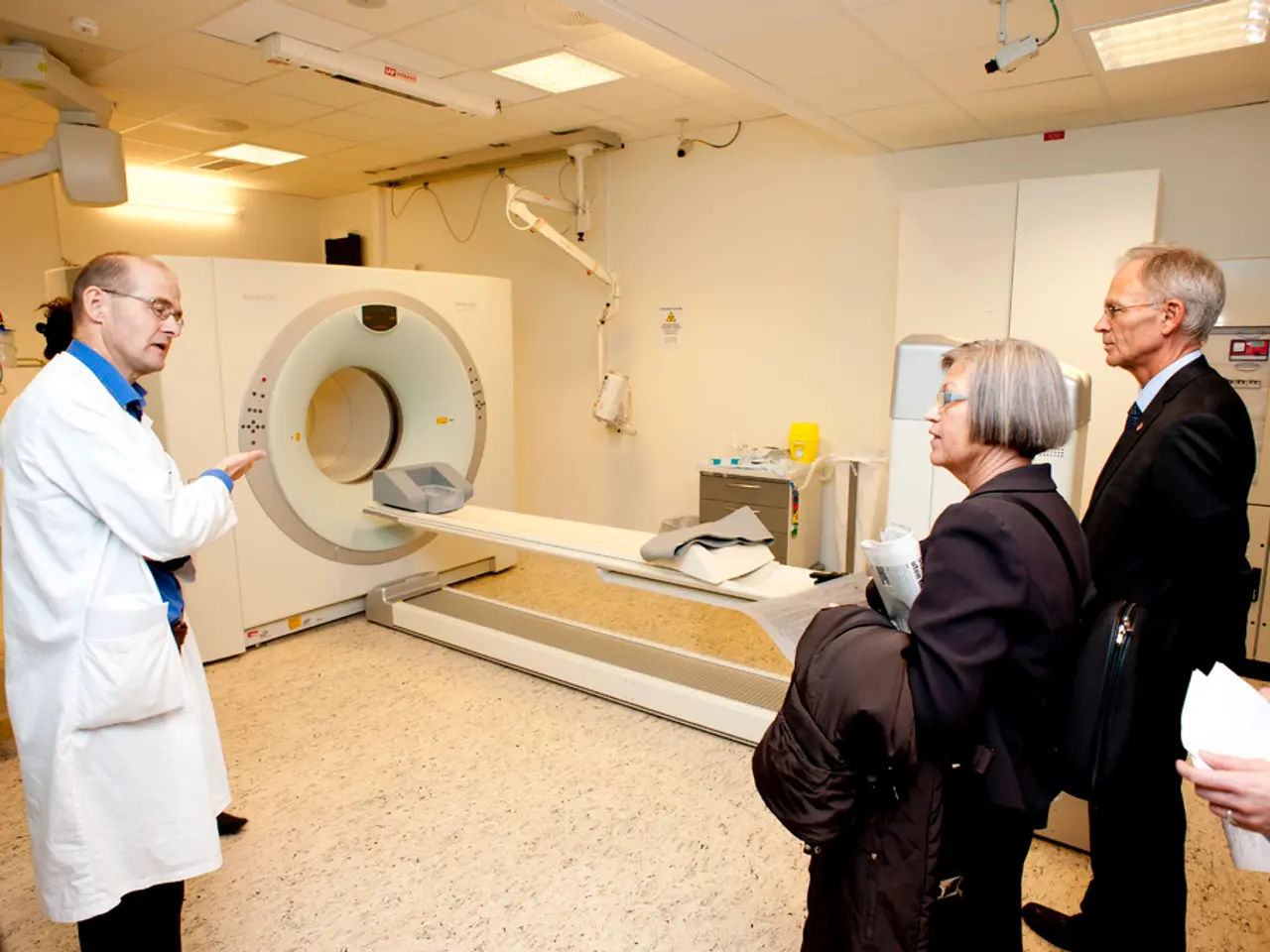Sleep lack disrupts anxiety levels and reconfigures brain operations, claims researchers.
Struggling with anxiety can be a real pain in the butt, amirite? But what you might not know is that this little thing called sleep could be playing a huge role in your anxiety levels. And we're not just talking about those nights when you're tossing and turning, unable to catch some Zs - even just one night of insufficient sleep can crank up your anxiety by up to 30%!
That's right, according to some groundbreaking research from UC Berkeley, getting your beauty sleep is crucial for keeping those anxious thoughts at bay. Don't believe me? Check it out:
"Sleep loss triggers the same brain mechanisms that make anxiety disorders so disruptive," explains Dr. Matthew Walker, professor of neuroscience and psychology. "It's as if sleep deprivation is pressing the brain's emotional accelerator pedal, while simultaneously cutting the brake lines."
Now, this isn't just feeling a little extra edgy - we're talking about measurable changes in brain function that directly amplify anxious responses. For the 40 million American adults with anxiety disorders and countless others who experience occasional anxiety, understanding this connection is more than just interesting - it's essential knowledge that could completely transform how they manage their mental health.
The best part? These brain changes happen almost immediately and almost everyone is affected. Even people who typically don't struggle with anxiety report significant increases in anxiety symptoms following poor sleep. So whether you're worry-free or a seasoned anxious vet, you need to pay attention to your sleep game.
To really delve into what's happening in our brains when we skimp out on sleep, let's take a peek at some of the immediate, unseen changes:
The Unseen Changes You Feel But Can't See
When you miss out on quality sleep, your brain gets all sorts of wacky, even though you might not be able to see it yourself.
The emotional command center of your brain - the amygdala - becomes hyperactive like a proselytizer at a revival meeting. It's like someone set the alarm system to max sensitivity, but they forgot to add that pesky "false alarm" button.
Meanwhile, the prefrontal cortex, which usually keeps our emotional responses in check like a bouncer at an exclusive club, significantly reduces its regulatory control. It's like that bouncer suddenly invites everyone into the VIP section, and chaos ensues.
In one particularly revealing study, participants viewed emotionally neutral and negative images after both a full night's sleep and a sleepless night. After sleep deprivation, their amygdala activity Increased by over 60% in response to emotionally negative content!
"What makes this finding so concerning is how quickly these changes happen," notes Dr. Simon Evans, neuroscientist and sleep researcher. "It doesn't take weeks or even days of poor sleep - just one night can significantly alter how your brain processes emotional information."
In essence, problems that seemed manageable yesterday can feel overwhelming after a night of shit sleep. Your brain is literally interpreting the same information differently. But don't just take my word for it - ask Jamie Katz, a 34-year-old marketing executive:
"I noticed that my worst anxiety days almost always followed nights when I got less than six hours of sleep," she says. "On days after sleeping well, I could handle work stress that would have sent me spiraling if I was sleep-deprived."
The Importance of REM Sleep (And Why Most People Don't Get Enough)
Not all sleep is created equal when it comes to anxiety regulation, and this is where most sleep advice falls short.
REM sleep - the phase when most dreaming occurs - appears to be particularly important for emotional regulation and anxiety control. During REM sleep, your brain processes emotional experiences from the day and strips away their emotional charge.
"Think of REM sleep as overnight therapy," says Dr. Joanna Cooper, clinical psychologist specializing in sleep disorders. "It's when your brain revisits emotional experiences but in a neurochemical environment that allows you to process them without the same emotional intensity."
Studies using sleep-tracking technology have found that it's specifically REM sleep disruption - not just total sleep time - that most strongly predicts next-day anxiety levels. So even if you're clocking in the hours, if you're not getting enough REM sleep, your brain's emotional processing capabilities might still be compromised.
Most people get the majority of their REM sleep in the final hours of an 8-hour sleep period, which means that when you cut your sleep short, you're disproportionately cutting into the type of sleep your brain needs most for anxiety management.
The Brain-Gut Connection: How Your Gut Feels Your Anxiety
We know that your brain and gut are closely connected, and this connection plays a significant role in anxiety regulation.
When you don't get enough sleep, your brain sends signals to your gut that intensify feelings of anxiety. These signals activate the enteric nervous system (ENS), which is responsible for the feelings of butterflies and upset stomach you might get during times of stress.
A study published in the journal Frontiers in Psychology found that participants who were sleep-deprived had increased gut permeability (leaky gut) and altered gut bacteria. These changes can contribute to chronic inflammation, leading to heightened stress responses and increased anxiety.
So next time you find yourself getting anxious, take a deep breath and remember that your tummy might be just as stressed as you are.
Strategies for Better Sleep (And Less Anxiety)
The good news is that taking steps to improve your sleep quality can have rapid and significant benefits for your anxiety levels - often within days. But there are a few things you should avoid if you want to make meaningful progress:
- Relying on sleep medications or alcohol to force sleep - these approaches might help you fall asleep initially, but they typically reduce REM sleep and can even make your anxiety worse in the long run.
- Sleeping in too late or staying in bed too long - Snoozing your alarm a few times might seem like a nice way to catch up, but it can actually damage the quality of your sleep and make it harder to fall asleep at night. Stick to a regular sleep schedule to keep your body's internal clock regulated.
So what does work? Cognitive Behavioral Therapy for Insomnia (CBT-I) has consistently shown the strongest results, with success rates between 70-80% for improving both sleep and anxiety symptoms.
A few key components of CBT-I include:
- Strict sleep scheduling: Going to bed and waking up at the same time every day - even on weekends - helps regulate your body's internal clock and improves sleep quality.
- Stimulus control: Reserving your bed exclusively for sleep and sex can help your brain associate your bed with sleep rather than wakefulness or anxiety.
- Sleep restriction: Temporarily reducing time in bed to increase sleep efficiency, then gradually extending it as sleep quality improves.
- Cognitive restructuring: Identifying and changing negative thoughts about sleep that increase anxiety and prevent restful sleep.
There are also plenty of lifestyle changes you can make to help improve your sleep hygiene and reduce anxiety:
- Reducing caffeine intake after noon
- Engaging in regular physical activity
- Practicing relaxation techniques like meditation or deep breathing exercises
- Maintaining a consistent pre-sleep routine, such as reading a book or taking a warm bath
Adulting is Hard Enough - Don't Let Poor Sleep Make it Worse!
Anxiety and poor sleep are a vicious cycle that can be hard to break, but focusing on improving your sleep hygiene is a great place to start. With consistent effort and commitment, you can take control of your sleep, reduce your anxiety, and enjoy a more balanced, fulfilling life.
- The connection between technology and sleep is crucial for mental health, given that sleep loss can trigger brain mechanisms that amplify anxious responses, according to Dr. Matthew Walker of UC Berkeley.
- Incorporating health-and-wellness practices, such as adhering to good sleep hygiene and engaging in relaxation techniques like meditation, can significantly improve sleep quality and, in turn, help manage anxiety levels, as suggested by research and cognitive behavioral therapy for insomnia (CBT-I).







